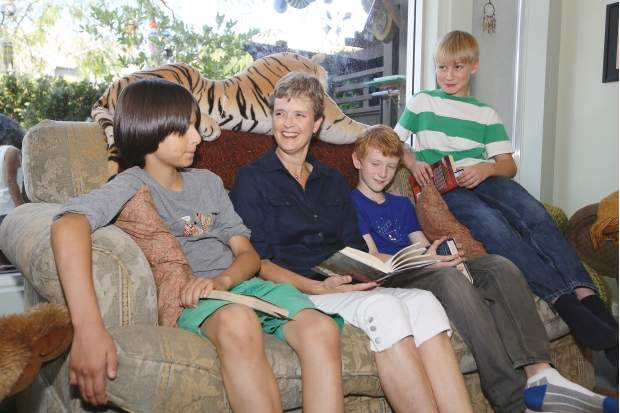Guatemalan refugees on the West Coast
People smuggling happens beyond the Mexico-USA border.
June 06th, 2019

Pam Withers is donating some of her royalties to the Migrant Offshore Aid Station [MOAS].
Pam Withers’ latest young adult novel is a suspenseful tale that imagines the plight of stowaways at the mercy of a nefarious captain. Review by Irene Watts.
Stowaway
by Pam Withers
Toronto: Dundurn, 2018
$12.99 / 9781459741911
Reviewed by Irene Watts
*
 Pam Withers has a staunch following for her young adult adventure novels. Fans will not be disappointed in Stowaway from Dundurn Press.
Pam Withers has a staunch following for her young adult adventure novels. Fans will not be disappointed in Stowaway from Dundurn Press.
In this complex adventure story we are introduced to two sixteen-year-old boys–one who is British Columbian and the other who is Latin American–who are burdened with secrets. At its core is the plight of people trying to escape poverty, imprisonment and torture. The Guatemalan is at the mercy of corrupt people smugglers.
This contemporary story about family, friends and loyalty is narrated, in the present tense, by its dual protagonists, Owen and Arturo. The immediacy of Wither’s storytelling instantly immerses the reader into their merging lives.
She begins with a tightly written prologue set in Guatemala City. The streets have been Arturo’s home since he was thrown out of his abusive home at age six. He protects a group of street boys chased by the police, hides them in a dumpster and draws police fire away from them by leaping onto the deck of a boat. The Captain saves Arturo, saying he is the boat’s first mate. With the street boys brought on board, Arturo lives with the guilt of knowing his charges are prisoners of “what is now a moving ghost ship. A death boat. A dumpster full of innocent souls – friends? — betrayed. By me.”
Sixteen-year-old Owen was brought up on his parent’s marina in Ontario, hence his familiarity with almost any vessel that goes to sea. The family relocated three years earlier to a small island in British Columbia, where Owen helps out on their marina. Withers’ facility in writing about boats is natural and easy to follow, even for the uninitiated. On a Saturday when his parents are about to fly out for a week’s conference, Owen is determined to make the most of his freedom. He finds the island dull after the excitement of hanging out with his brother Gregor and the friends of whom his parents have disapproved — the main reason why the family moved to B.C.
That night there is a storm severe enough to cause a power outage. Owen thinks he sees the shadow of a boat sailing into the bay, and a figure leaps down to secure the boat in an empty berth. Hours later he is awoken by taps at the window. He opens the door to a thin boy seeking help.
Arturo speaks in broken English and asks for water and diesel. The boat’s battery is low.
Owen gives him water, and says he’ll come down to the boat in the morning and help him fuel up.
The next day, he meets Captain Jones on board the Archimedes, and refuels as promised. Owen is encouraged by the advice he hears in his head from his absent brother, Gregor, to make the most of his freedom while their parents are away. He stows away aboard the yacht, hiding in the dinghy overnight. In the morning he begs the Captain to let him stay on, just to reach the next port of call, a couple of hours away. He shares chores with Arturo. The Captain agrees to let Owen remain on board when he discovers that no one knows of Owen’s whereabouts.
Owen discovers there are six Guatemalan youths hidden on the Archimedes. He sees the Captain is cruel, greedy and vicious; he beats Arturo for every infraction. Everything goes from bad to worse when armed pirates board the ship and steal the money paid by the parents of the boys to take them safely to Canada.
Captain Jones turns all of them over, including Owen and Arturo, to a safe-house keeper who starves and works the boys almost to death on a remote tree planting site. Bonds between Owen, Arturo and the boys are forged, broken and renewed. Before they escape and reach safe harbour, their lives will be changed forever.
Withers maintains suspense throughout. More importantly, her characters are complex and believable. They grow and change. Even Owen’s unseen brother Gregor is fleshed out. Owen and Arturo help each other to trust in themselves and not be manipulated by others.
I was particularly impressed by Arturo, to whom English is still new: Withers writes part of the narrative in the voice of someone who is still learning a new language; it is flawlessly done. “I’m not good enough to think in English yet,” he confides. Dialogue between the Guatemalan boys is similarly credible.
Owen is a strong and likeable voice; he holds the intricate plot together. I love his youthful Canadian sense of humour and his understanding and sympathy for the plight of the boys for whom he eventually takes responsibility.
The story ends on a hopeful note and leaves the reader wanting more. Will Owen achieve his goal of becoming a Coast Guard? What does the future hold for Arturo and the other boys? Might there be a sequel?
I highly recommended Stowaway for ages twelve and up. This is an accomplished and riveting novel, beautifully written and researched by a writer secure in her craft.
A portion of royalties will be donated to the Migrant Offshore Aid Station [MOAS] which, we learn, has saved more than twelve thousand lives. Founded in 2013 in response to the Mediterranean maritime migration phenomenon, Moas is an international humanitarian organisation dedicated to providing aid and emergency medical relief to refugees and migrants around the world. MOAS claims to have reached over 100,000 children, women and men through its rescue and relief programs.
*
Playwright/writer, Irene N. Watts, was born in Berlin, educated in England and Wales, and has made her home in Canada since 1968. Her trilogy: Good-bye Marianne, Remember Me, and Finding Sophie (Tundra Books, 1998-2002), was inspired by her own journey out of Nazi Germany by Kindertransport. She writes in different genres: picture and chapter books, plays, and historical novels. Her most recent work is Seeking Refuge, a graphic novel illustrated by Kathryn E. Shoemaker (Tradewind Books, 2016). Her favourite awards include the Geoffrey Bilson Award for Historical Fiction, the Western Canadian Jewish Book Award, and B.C.’s Chocolate Lily Award. She is a life member of Playwrights Guild of Canada.
*
The Ormsby Review. More Books. More Reviews. More Often.
Editor/Designer/Writer: Richard Mackie
Publisher: The Ormsby Literary Society
The Ormsby Review is a journal service for serious coverage of B.C. books and authors, hosted by Simon Fraser University. The Advisory Board consists of Jean Barman, Robin Fisher, Cole Harris, Wade Davis, Hugh Johnston, Patricia Roy, David Stouck, and Graeme Wynn. Scholarly Patron: SFU Graduate Liberal Studies. Honorary Patron: Yosef Wosk. Provincial Government Patron since September 2018: Creative BC
“Only connect.” – E.M. Forster





Leave a Reply